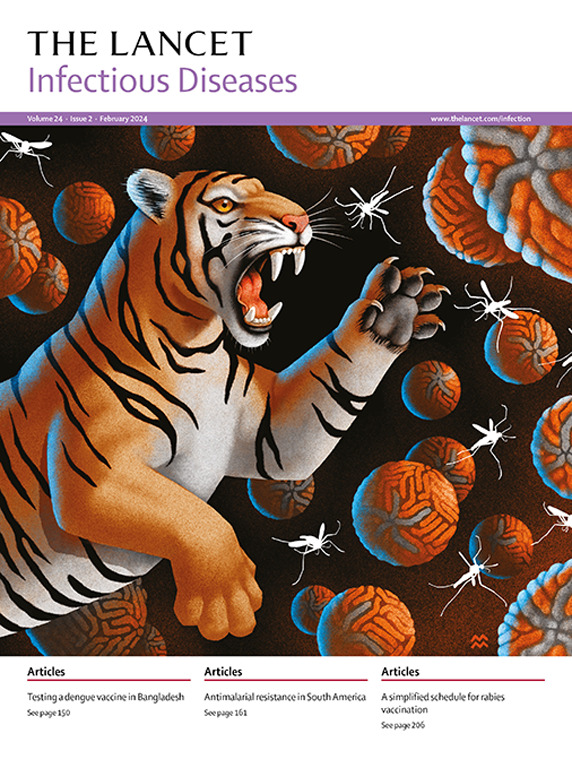New WHO guidelines for treating rhodesiense human African trypanosomiasis: expanded indications for fexinidazole and pentamidine
IF 36.4
1区 医学
Q1 INFECTIOUS DISEASES
引用次数: 0
Abstract
Human African trypanosomiasis is a neglected tropical disease that is usually fatal without treatment. WHO has revised its rhodesiense human African trypanosomiasis treatment guidelines on the basis of an independent systematic literature review and following the GRADE methodology. This Review reports on the decision-making process and summarises the new recommendations and their potential implications for health-care professionals and policy makers. Due to data scarcity, all recommendations are conditional and based on very low certainty of evidence. Fexinidazole replaces suramin and melarsoprol as the first-line therapy in individuals aged 6 years and older with a bodyweight of 20 kg or more. As fexinidazole is effective in both stages of rhodesiense human African trypanosomiasis, a lumbar puncture for staging is no longer required. In settings in which first-choice drugs are not readily available, immediate interim treatment with pentamidine is suggested. The introduction of oral fexinidazole represents an advancement in the management of rhodesiense human African trypanosomiasis considering the life-threatening adverse reactions individuals can have to melarsoprol. However, children below the age or weight limits remain ineligible for treatment with fexinidazole.世界卫生组织治疗非洲罗得西亚非洲锥虫病的新指南:扩大非西尼达唑和喷他脒的适应症范围
非洲锥虫病是一种被忽视的热带疾病,不治疗通常会致命。世卫组织在独立系统文献综述的基础上,按照 GRADE 方法修订了罗得西亚非洲锥虫病治疗指南。本综述报告了决策过程,总结了新的建议及其对医疗保健专业人员和政策制定者的潜在影响。由于数据稀缺,所有建议都是有条件的,并基于非常低的证据确定性。对于体重在 20 公斤或以上的 6 岁及以上儿童,非欣达唑取代舒拉明和美拉索洛尔成为一线治疗药物。由于非西尼达唑对罗得西亚非洲锥虫病的两个阶段都有效,因此不再需要腰椎穿刺进行分期。在没有首选药物的情况下,建议立即使用喷他脒进行临时治疗。考虑到个人对美拉索普罗(melarsoprol)可能会产生危及生命的不良反应,口服非西尼达唑(fexinidazole)的引入标志着罗得西亚非洲锥虫病治疗的进步。不过,年龄或体重未达标的儿童仍不符合使用非西尼达唑治疗的条件。
本文章由计算机程序翻译,如有差异,请以英文原文为准。
求助全文
约1分钟内获得全文
求助全文
来源期刊

Lancet Infectious Diseases
医学-传染病学
CiteScore
60.90
自引率
0.70%
发文量
1064
审稿时长
6-12 weeks
期刊介绍:
The Lancet Infectious Diseases was launched in August, 2001, and is a lively monthly journal of original research, review, opinion, and news covering international issues relevant to clinical infectious diseases specialists worldwide.The infectious diseases journal aims to be a world-leading publication, featuring original research that advocates change or sheds light on clinical practices related to infectious diseases. The journal prioritizes articles with the potential to impact clinical practice or influence perspectives. Content covers a wide range of topics, including anti-infective therapy and immunization, bacterial, viral, fungal, and parasitic infections, emerging infectious diseases, HIV/AIDS, malaria, tuberculosis, mycobacterial infections, infection control, infectious diseases epidemiology, neglected tropical diseases, and travel medicine. Informative reviews on any subject linked to infectious diseases and human health are also welcomed.
 求助内容:
求助内容: 应助结果提醒方式:
应助结果提醒方式:


